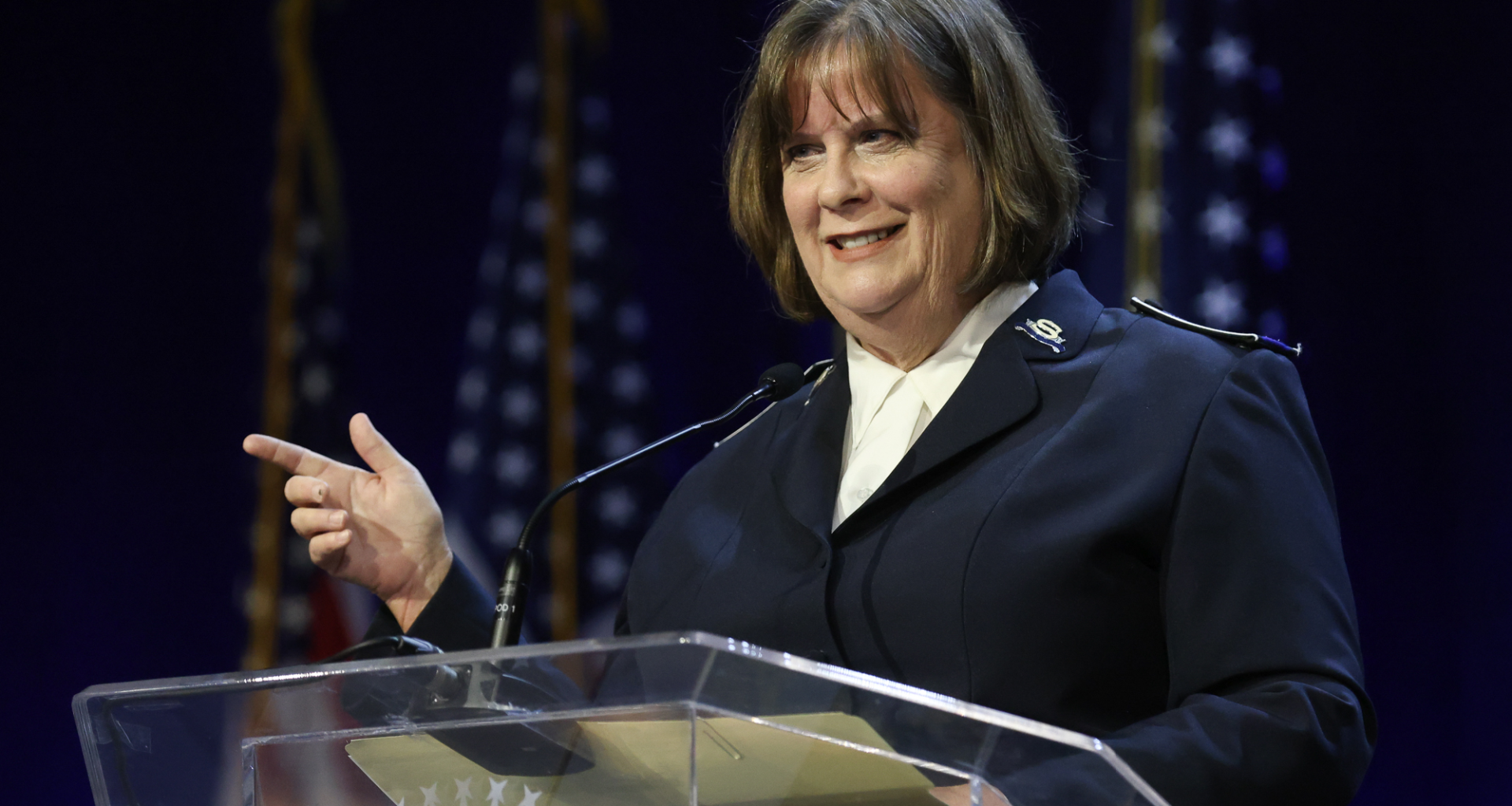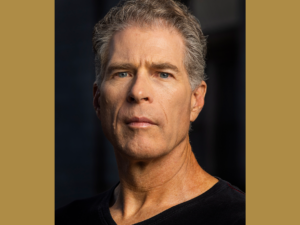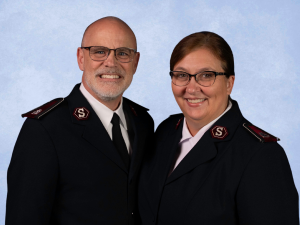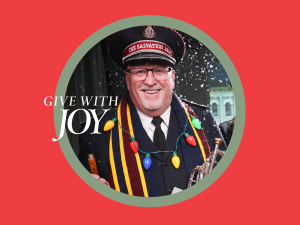This past weekend, in Pasadena, California, The Salvation Army from around the Western Territory joined for an event focused on teaching, training and motivating Salvationists to tell the story of Jesus more often and to more people—the 2024 Testify Congress.
The annual celebration includes the commencement, commissioning, ordination and appointment of cadets as they’ve completed two years of training at the College for Officer Training at Crestmont to become Salvation Army officers.
But this year was bigger than ever as The Salvation Army’s international leaders, General Lyndon Buckingham and Commissioner Bronwyn Buckingham, traveled from London to be part of it all.
You’ll remember the General from episode 178, where we chatted about why your testimony matters (and how to use it for good).
Now, we’re dedicating our next few episodes to sharing the highlights with you, starting today with the commencement address by Dr. Sharon Docter.
Dr. Docter is a professor of communication at California Lutheran University and a member of the Board of Governance for the College for Officer Training. She’s also a lay leader, the Corps Sergeant Major, of the Pasadena Tabernacle Corps. And fun fact, Sharon is also the daughter of our founding editor, Dr. Bob Docter.
This session of graduating cadets is named the Defenders of Justice. Listen in as Dr. Docter shares three superpowers cadets need when beginning their life as officers from a soldier’s perspective: authenticity, presence and seeing people as they really are.
Listen and subscribe to the Do Gooders Podcast now. Below is a transcript of the episode, edited for readability. For more information on the people and ideas in the episode, see the links at the bottom of this post.
* * *
Dr. Sharon Docter: Thank you so much, Evan, and Territorial Youth Chorus.
General and Commissioner Buckingham, Territorial Leaders, Staff, Faculty, Officers, Soldiers, Board Members, Friends, and especially our Cadets. What a pleasure it is to be with you today. I have thoroughly enjoyed my time on the College for Officer Training Board of Governance because I’ve had the opportunity to see up close the amazing work of the faculty and staff in training future officers. In addition, I also get to see the talented, committed, Jesus-loving cadets who give me such hope. Hope not only for the future of The Salvation Army, but hope for a better world.
Cadets, you are the Defenders of Justice.
I love that name, but I have to confess something. When I first heard your session name, it brought to mind Marvel superheroes with their superpowers to save the world and defend justice. In many ways, I think the work that our officers do requires superpowers. You must be experts in so many different areas and wear many different hats.
And yet you do so by walking humbly, loving mercy, and acting justly. And so today, I’d like to say to every cadet and every officer in this room, you are superheroes.
So what are the superpowers that our superhero cadets need? I’d like to focus on three today, and I’d like to speak to you with your permission, not as a member of the Board of Governance, but as a soldier.
The first superpower that I think you need is authenticity. I would imagine as future officers, you sometimes feel like you have to have it all together all the time because you’ve dedicated your lives to ministering to others. Maybe even some current officers feel this way too. I know that as a Sergeant Major, sometimes I feel like I have to have it all together all the time. This was brought home to me several years ago when I was sitting at my corps going through a difficult time in my life—difficult, real stuff.
When the invitation came to go to the altar, I thought about going down, but then I thought, well, how would that look? I’m supposed to be the person helping others. Won’t it look bad if I’m the one that needs the help? And I realized that what was really going on here was pride, was a desire to appear like everything in my life was great when it really wasn’t.
During the altar call, a mother whose son was in the ARC [Adult Rehabilitation Center] came forward to pray, and I went down to pray with her. And she was praying a prayer of gratitude that her son and her family were doing well thanks to the amazing work of the ARC. After we finished praying, she must have intuited something about me, or maybe it was the Holy Spirit, because she looked up. And she looked into my eyes and said, Now, can I pray for you?
I will never forget that woman. I’ve never seen her again. But she gave me what I needed in that moment, which was prayer and connection. My own need to seem like I had it all together almost prevented me from this spiritual encounter. I almost missed this holy moment because of my desire to appear perfect rather than vulnerable.
Cadets, your soldiers don’t need perfection. They need authenticity. You don’t need to seem like you have it all together all the time, like you have all the answers. Instead, you just need to be real. And sometimes it’s even OK to struggle. Some of the most powerful moments that I’ve experienced at my corps in listening to corps officers is when they have been authentic and vulnerable.
I remember listening to Major Masango talk about what it meant to be a black man living in Pasadena in 2020. I remember Commissioner Hill telling self-deprecating anecdotes to illustrate biblical truths. The one with the rodent in the garbage disposal comes to mind. You’ll have to ask him about that one.
I remember last Sunday when Major Wild was almost brought to tears talking about the freedom that comes in relationship with God. The power of these moments impact me today because of their authenticity.
This brings me to the next superpower, the power of presence.
I have a friend who is a Lutheran pastor, and his first job after graduating from seminary was as a hospital chaplain. And he sat in his office on his first day of work, and he thought, no one really trained me how to do this. He said, I’ve studied the Bible. I’ve studied theology. But what do I say to people who are grieving? And then he got the call. Someone had lost a family member, and they wanted him to come.
As he arrived, the family had gathered together. They began telling stories about the deceased. Some stories made them laugh, some made them cry. Throughout this, my friend simply listened. When it came time to go, he offered a prayer. This family, strangers to this pastor, thought that he was the most wonderful person ever.
He realized that his words were not important. In fact, he didn’t need to say anything. He just needed to listen and to be present. I have had tremendous corps officers throughout my life. They have come with many different skills and abilities, and I’ve loved and appreciated each and every one. You know who you are out there.
And in fact, I saw five of them as I walked in today. Each one gave me a word of encouragement, said, I’m praying for you. I mean, what a beautiful, beautiful thing.
But, corps officers, I have a confession to make. With some exceptions, I don’t always remember your sermons.
In fact, if you asked me to recall specific points of specific sermons of a corps officer, I would be pretty hard-pressed to do so. But I will never forget the ways that you have shown up for me and my family in hospital rooms or celebrations or weddings or retirements or funerals. In times of great joy and great grief, your presence has impacted me more than you will ever know.
Cadets, your soldiers don’t always need your words. They need your presence.
This brings me to the third superpower required of future officers, the power to really see people for who they are.
Sometimes it’s hard to see people in a world that is becoming increasingly diverse and complex and even divided. I was reminded of the complexity of our world when my daughter Grace was 11. Her class was having a party, so she signed up to bring a pie to class.
When she asked me to get the pie, she said, make sure the pie doesn’t have any gelatin, because gelatin contains pork products, and Muslims don’t eat pork. So make sure there’s no gelatin. And I said, OK. And then she said, and there’s a gluten-free child in my class, so make sure the pie is gluten-free. And I said, OK. And then she said, you know what? There’s some Jewish kids, too, so maybe it should be kosher.
And I said, no problem, gelatin-free, gluten-free, blessed by a rabbi. You got it. I am quite certain I never had this conversation with my mother. If I ask my mom, can I bring a pie to class? Sure. What kind? Apple. That would be that.
How different Grace’s experience is than mine and how fortunate that she has been exposed to so many diverse people. And as I thought about this conversation, this pie, it represented two things for me. The pie represented my daughter’s respect for difference, which is loving the neighbor. Loving people who are different than us is hard.
But isn’t that what is required of all of us? Simply to love without judgment. Jesus reached out to those who were most different. He put his hands on lepers, invited tax collectors to dinner, befriended shunned women, told stories where the outsider, the Samaritan, was the superhero. Truly remarkable.
And isn’t that what it means to be a Defender of Justice? The pie also represented the increasing complexity of our time. Our world is becoming increasingly diverse and complex. And managing complexity requires increased effort and also increased empathy and understanding. It requires seeing people.
So how is it that we develop this superpower of seeing people? By leaning in and leading with empathy, especially when we encounter people who are invisible or who feel invisible. The trans kid, the adult with autism, the unhoused person, the really annoying coworker. Let empathy be your first response.
Now, this is hard, right? It’s hard to show empathy, particularly with those who don’t look or think or act or even love like we do. In any corps, there’s going to be conflict. And what challenges you will have managing that conflict.
But here’s the bottom line. Church is made up of people. And anywhere there are people, there is messiness.
Just because we’re Christians, doesn’t mean everything is always sunshine and roses. I’m sure there’s always going to be things about our corps that we don’t like. It might be the kind of music that we sing or our views on social or political issues. If I am looking for a corps where everyone agrees with me, I will be in a corps with one member and that would be myself.
Some things we have to pursue until we get some agreement, but others we should probably just leave alone so that they can remind us that there are people in the world just as sincere as we are who don’t see things our way. We need each other to save ourselves from thinking that our way is always the best.
So one thing I’ve been working on when I encounter people who see things differently than me, is to have empathy be my first response. Now this is hard, especially when I’m usually convinced that I am right.
But something changes in me when I lead with empathy. I’m able to see others with greater compassion and deeper understanding. And in those moments, I feel a greater connection to those around me, and therefore, a greater connection to God.
I remember a story my dad told once about someone who led with empathy. The story takes place at a church in Texas.
It was a special holiday. The church was packed and everyone came dressed in their finest clothes. They were ready to be blessed. As the pastor began his sermon, something happened. The back door opened and a woman opened the door and began walking down the center aisle. Her clothes were tattered. Her hair was messy. She had a tear on the sleeve of her shirt. As she walked in, she looked like she didn’t know what she should do.
She began walking slowly down the center aisle. When she got about three-quarters of the way down, she simply sat on the ground right in the middle of the aisle. No one really knew what to do. It made everyone a little uncomfortable. An older man, John, who attended the church for many years, slowly got up from his seat. I’m sure some people felt relieved. That’s great, John is going to take care of this.
John slowly made his way out of his pew and down the aisle, and when he reached her, he simply sat down on the ground in the aisle next to her.
This man knew what it meant to see people and ultimately to love. John had the superpower of leading with empathy, which gave him the power to see others as Jesus sees them. Cadets, your soldiers don’t need your judgment. They need your empathy.
Seeing people requires that we lean in. Now this is not always my inclination, I have to confess.
I recently met my friend Michelle at a local Starbucks. We were both in a rush and we had only about 15 minutes. And she’s been my friend since middle school, and I was really looking forward to catching up with her. And as we were talking, a man in his 40s or 50s, who was clearly developmentally disabled, approached us, interrupted us, and said, gee, you ladies look nice today.
I have to confess, I did what I always do. Look down, avoid eye contact, hope that he goes away. Not so with Michelle. She looked him in the eyes and said, thank you.
I was annoyed because this guy was interrupting my limited time with my friend and yet my friend fully engaged him. He talked about how his best friend had recently passed away, how he wanted to go to heaven to be with his mother and father. And she took the time and the care and the effort to see the face of Jesus in him.
For as you have done to the least of those, so you have done unto me [Matt. 25:40].
My tendency was to lean out, yet seeing people requires that we lean in. And we can see others and therefore the face of God in ordinary interactions at home, at school, at work, at Starbucks and Trader Joe’s and the gas station. All we need to do is lean in to him and to others to see his presence.
Well, I’ve been talking a lot about superpowers today, but Defenders of Justice, we all know that you have all the superpowers that you need. The power that comes from the Holy Spirit and the love of Jesus. It is already there, working in you and through you. Once you experience it, it gets easier to spot.
Whenever you find yourself speaking with an eloquence that you did not think you had, or leaning into someone you had intended to walk away from, or having the courage to be authentic. Whenever you find yourself being present for others, or really seeing someone who feels invisible, or working hard to let empathy be your first response, you are living the gospel of the Holy Spirit. And more than that, you are taking part in it, taking God into you, and giving God back to the world.
So, Defenders of Justice and all of us, here’s the plot twist. You actually don’t need any superpowers at all. Seeing Jesus and seeing others requires no special skill. All he requires is our willingness to reach out to him and to others in love. Thank you.
Additional resources:
- You’ve probably seen the red kettles and thrift stores, and while we’re rightfully well known for both…The Salvation Army is so much more than red kettles and thrift stores. So who are we? What do we do? Where? Right this way for Salvation Army 101.
Listen and subscribe to the Do Gooders Podcast now.












